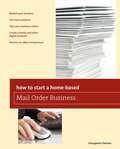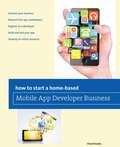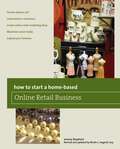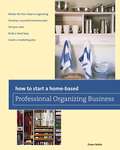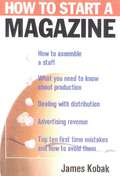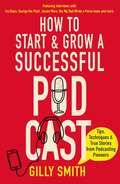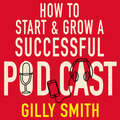- Table View
- List View
How to Start a Home-based Fashion Design Business (Home-Based Business Series)
by Angela WolfThis book will be a priceless resource for those considering adventuring into the fashion industry, yet not knowing how or where to start. Comprised of detailed information, How to Start a Home-based Fashion Design Business will be a guide for the aspiring designer to plan and execute a successful home based business. This material will not only provide a fashion realm, but will show how to create additional revenue streams in the sewing field. This book will be the "one stop shop" for the small designer.
How to Start a Home-based Graphic Design Business (Home-Based Business Series)
by Jim SmithThis book will include all the information you need to get started at home with your own graphic design business. To expand the focus of this subject matter, we plan on including information on designing blogs, apps, and the like to take this book a step ahead of the competition.
How to Start a Home-based House Painting Business (Home-Based Business Series)
by Deborah BouzidenEverything you need to know to run a profitable and satisfying house painting business from your home.
How to Start a Home-based Mail Order Business (Home-Based Business Series)
by Georganne FiumaraEverything you need to know to run a profitable and satisfying mail order business from your home.From painless business planning to achieving success in cyberspace, this book&’s step-by-step methods are practical and easy to understand, and they will put you on the path to building your own home-based business. Whether you are looking to assess your personal skills, estimate your start-up costs, choose the right products, or stay profitable once you are in business, each chapter will guide you on every aspect of setting up and running a thriving home-based mail order business. Look for useful charts and worksheets throughout the book, including:Common Questions and AnswersProfiles of Successful BusinessesExpense SummariesSample Press Release Direct Mail Checklist
How to Start a Home-based Makeup Artist Business (Home-Based Business Series)
by Deanna NickelEverything you need to know to run a profitable and satisfying makeup artist business from your homeThis comprehensive guide takes you through every aspect of setting up and running a thriving home-based makeup artist business, from separating yourself from your competition and successful branding techniques to makeup must-haves and have-nots. Learn all about developing a price structure, traditional versus online marketing, getting press, and establishing policies, and enjoy an entire section on how to tap into the lucrative bridal market. Whether you are just starting out or looking to expand your business, each chapter can help you build your own successful home-based makeup artist business. Look for useful charts and worksheets throughout the book, including: Standard Face ChartSample Client CardMarketing Strategy Worksheet Sample ContractBridal Trial Chart
How to Start a Home-based Massage Therapy Business (Home-Based Business Series)
by Shirley PhilbrickMassage therapists need basic, practical business advice such as low to mid-cost marketing techniques, taxes, and recordkeeping, but there is also no denying the benefits of &“been there, done that&” information that can only come from someone else&’s experience. How to Start a Home-based Massage Therapy Business offers a gold mine of tips and ideas that can lessen the learning curve, stimulate thinking outside-the-box, and increase the odds of having a wildly successful practice.
How to Start a Home-based Mobile App Developer Business (Home-Based Business Series)
by Chad BrooksWith the app market exploding, app designers will need a solid how-to guide to help them start their home-based business. This book will guide the reader through all the steps from design to marketing.
How to Start a Home-based Online Retail Business (Home-Based Business Series)
by Nicole AugentiFrom getting started and finding customers to creating your website and mastering social media, this comprehensive guide provides down-to-earth advice on every aspect of setting up and running a thriving home-based online retail business. Learn all about setting up your home office, sourcing your product, marketing from all angles, getting paid, and staying ahead of the competition. Look for useful information throughout the book, including:Online Retail Success StoriesSample Financial PlanBusiness Scenarios and Lesson LearnedEducational ResourcesFrequently Asked Questions
How to Start a Home-based Personal Chef Business (Home-Based Business Series)
by Denise VivaldoFrom estimating your start-up costs and finding clients to cooking for special needs and staying profitable, this book takes you through every aspect of setting up and running a thriving home-based personal chef business. Whether you&’re just starting to learn the trade or are an experienced chef looking to be your own boss, each chapter will guide you on how to build your own successful personal chef business.
How to Start a Home-based Pet Grooming Business (Home-Based Business Series)
by Kathy Salzberg Melissa SalzbergThis comprehensive guide contains all the necessary tools and strategies you need to successfully launch and grow your own home-based pet grooming business. You'll get practical, real-world advice on every aspect of setting up and maintaining a thriving business.
How to Start a Home-based Professional Organizing Business (Home-Based Business Series)
by Dawn NobleFrom estimating start-up costs and finding clients to how to stay profitable even in slow economic climates, this book takes you through every aspect of setting up and running a thriving home-based professional organizing business. Whether you&’re just starting to explore your options for a home-based business or are an organizing wizard looking to be your own boss, each chapter will guide you on how to build your own successful organizing business. Look for useful charts and worksheets throughout the book, including:Start-Up Costs ChecklistClient Intake FormAssessment Visit/Working AgreementSample InvoiceMarketing Plan Worksheet
How to Start a Home-based Public Relations Business (Home-Based Business Series)
by Randi MinetorEverything you need to know to run a profitable and satisfying public relations business from your home Learn all about generalization versus specialization, how to make and manage money, running an ethical business, and building client relationships in this comprehensive guide that takes you through every aspect of setting up and running a thriving home-based public relations business. From your business identity and marketing techniques to guarding against your own errors and cashing out, each chapter can help you build your own successful home-based public relations business, whether you are just starting out or a seasoned PR professional. Look for useful charts and worksheets throughout the book, including: Home Office Location Screening ChecklistThree-Tiered Prospect Pitch ListEstimate Questions and FormBudget and Cash Flow ProjectionsInterviews from the Field
How to Start a Home-based Quilting Business (Home-Based Business Series)
by Deborah BouzidenQuilting is big business. This book is for anyone who wants to turn their love for quilts into profit in a market that is viable and continues to grow. It will guide the reader through all the aspects of setting up and running a thriving home-based quilting business.
How to Start a Home-based Wedding Photography Business (Home-Based Business Series)
by Kristen JensenThis comprehensive guide takes you through every aspect of setting up and running a thriving home-based wedding photography business, from separating yourself from your competition and creating your portfolio to knowing what types of equipment you need and setting up client proofing sites. Learn all about developing a price structure, hiring second shooters, creating a website, blogging and using other social media outlets, and developing a photo editing system. Whether you are just starting out or looking to expand your business, each chapter can help you build your own successful home-based wedding photography business. Look for useful charts and worksheets throughout the book, including:What to Pack in Your Camera BagPackage Pricing OptionsSample Contracts and InvoicesPre-Wedding Day ChecklistWedding Day Shot Lists
How to Start a Magazine: And Publish It Profitably
by James B. KobakAnyone who wants to start a magazine and doesn't own this book is a fool.-Victor Navasky, Publisher, The Nation Timely and informative, this book explains all the steps needed in planning, testing, and executing the startup of a successful magazine. But more than this, the book serves as a resource for understanding how profitable magazine publishing is carried out, as well as the current situation in the magazine field, including branding over the Internet and other media.
How to Start a Successful Home Business
by Karen Cheney Lesley AldermanWith computer, fax machines, and other technologies becoming commonplace, more and more people are running businesses from their homes and making a good living in the process. "Money" has been tracking the trend, and, in this new guide, two of the magazine's writers explain how to turn a hobby into a business, find money to start, create a winning business plan, manage cash flow, write great press releases, find low-cost health insurance and safeguard retirement, and much more.
How to Start and Grow a Successful Podcast: Tips, Techniques and True Stories from Podcasting Pioneers
by Gilly SmithThe only guide you need to build a podcast from scratch with tips, techniques and stories from the pioneers of podcasting, by expert and early adopter Gilly Smith. From This American Life's Ira Glass and George the Poet to the teams behind My Dad Wrote a Porno and Table Manners with Jessie Ware, this practical book is packed full of exclusive, behind-the-scenes advice and informative, inspiring stories that will teach you how to tell the greatest stories in the world.This is a comprehensive yet accessible and warmly written book for creatives who are striving to understand how their content could be successfully turned into a podcast, from conception through to execution, distribution, marketing and monetising. It covers:- Recognising who your show is for, deciding what it is about and where to find inspiration.- Deciding on the format and working on structure and script.- Hosting, casting and interview techniques.- Production expertise - from equipment you'll need to editorial tips and determining the ideal length of your show.- Distribution - deciding on a release schedule, show art, metadata and how to distribute. - Growing your podcast - promotion and building community among fans. With original material throughout, case studies from podcasters across genres and a companion podcast featuring interviews with the pioneers, this is a first in guides to podcasting.
How to Start and Grow a Successful Podcast: Tips, Techniques and True Stories from Podcasting Pioneers
by Gilly SmithThe only guide you need to build a podcast from scratch with tips, techniques and stories from the pioneers of podcasting, by expert and early adopter Gilly Smith. From This American Life's Ira Glass and George the Poet to the teams behind My Dad Wrote a Porno and Table Manners with Jessie Ware, this practical book is packed full of exclusive, behind-the-scenes advice and informative, inspiring stories that will teach you how to tell the greatest stories in the world.This is a comprehensive yet accessible and warmly written book for creatives who are striving to understand how their content could be successfully turned into a podcast, from conception through to execution, distribution, marketing and monetising. It covers:- Recognising who your show is for, deciding what it is about and where to find inspiration.- Deciding on the format and working on structure and script.- Hosting, casting and interview techniques.- Production expertise - from equipment you'll need to editorial tips and determining the ideal length of your show.- Distribution - deciding on a release schedule, show art, metadata and how to distribute. - Growing your podcast - promotion and building community among fans. With original material throughout, case studies from podcasters across genres and a companion podcast featuring interviews with the pioneers, this is a first in guides to podcasting.
How to Start and Grow a Successful Podcast: Tips, Techniques and True Stories from Podcasting Pioneers
by Gilly SmithThe only guide you need to build a podcast from scratch with tips, techniques and stories from the pioneers of podcasting, by expert and early adopter Gilly Smith. From This American Life's Ira Glass and George the Poet to the teams behind My Dad Wrote a Porno and Table Manners with Jessie Ware, this practical book is packed full of exclusive, behind-the-scenes advice and informative, inspiring stories that will teach you how to tell the greatest stories in the world.This is a comprehensive yet accessible and warmly written book for creatives who are striving to understand how their content could be successfully turned into a podcast, from conception through to execution, distribution, marketing and monetising. It covers:- Recognising who your show is for, deciding what it is about and where to find inspiration.- Deciding on the format and working on structure and script.- Hosting, casting and interview techniques.- Production expertise - from equipment you'll need to editorial tips and determining the ideal length of your show.- Distribution - deciding on a release schedule, show art, metadata and how to distribute. - Growing your podcast - promotion and building community among fans. With original material throughout, case studies from podcasters across genres and a companion podcast featuring interviews with the pioneers, this is a first in guides to podcasting.
How to Start and Operate Your Own Design Firm: A Guide for Interior Designers and Architects
by Albert W. Rubeling Jr.Baltimore-based Rubeling draws from two decades of owning a multimillion-dollar architectural firm to offer insights to readers interested in the business side of design. Fourteen chapters offer tips and exercises for making the decision to own a firm; establishing vision and goals; understanding financial, marketing, banking, equipment, legal, and insurance considerations; developing marketing and business plans; assessing risk; setting fees and establishing a client base; defining success; and thinking about the future. Appendices contain a sample design proposal and glossaries. Annotation ©2007 Book News, Inc. , Portland, OR (booknews. com)
How to Start and Operate a Digital Portrait Photography Studio
by Lou JacobsTwenty successful studio owners offer their expertise to aspiring professional photographers in this guide to operating a digital portrait studio. Every element of a thriving studio is covered, from choosing a location and determining a budget to selecting computer equipment and streamlining the digital work flow. Details on selecting backgrounds, sets, and props that set a studio apart and advice on lighting patterns, posing, and clothing selection help photographers ensure that they produce client-pleasing images and return customers. Customer service tips on creating comfortable waiting and viewing areas are included to help photographers set up an attractive space to better profit from their artistic skills.
How to Start and Run a B&B, 4th Edition
by Stewart WhyteOwning a B&B is the dream of many ... More and more people are considering downshifting. Buying a property that can pay for its own upkeep and give you a comfortable lifestyle is a popular option. Not only has the interest grown in becoming a B&B proprietor, so has the interest by the public in the B&B as a viable short-break option. With this rise in popularity, however, come expectations, and this is where this book comes in. - It will help you: - Determine who your customers are- Manage the necessary financial tools- Ready your house for B&B service, or help you buy/build a new one- Successfully market your property- Ensure you make a profit from your enterprise. In short, everything you need to know to make your B&B a truly special place to stay! This book has been written for would-be and current B&B owners. It can be used as a short course giving invaluable insights for the experienced and inexperienced alike.
How to Start and Run a B&B, 4th Edition
by Stewart WhyteOwning a B&B is the dream of many ... More and more people are considering downshifting. Buying a property that can pay for its own upkeep and give you a comfortable lifestyle is a popular option. Not only has the interest grown in becoming a B&B proprietor, so has the interest by the public in the B&B as a viable short-break option. With this rise in popularity, however, come expectations, and this is where this book comes in. - It will help you: - Determine who your customers are- Manage the necessary financial tools- Ready your house for B&B service, or help you buy/build a new one- Successfully market your property- Ensure you make a profit from your enterprise. In short, everything you need to know to make your B&B a truly special place to stay! This book has been written for would-be and current B&B owners. It can be used as a short course giving invaluable insights for the experienced and inexperienced alike.
How to Start and Run a Commercial Art Gallery
by Edward WinklemanAspiring and new art gallery owners can now find everything they need to plan and operate a successful art gallery in this comprehensive volume. Edward Winkleman draws on his years of experience to explain step by step how to start your new venture. Chapters detail how to: - write a business plan - find start-up capital - find your ideal locale - renovate the space - manage cash flow - promote and grow your new business - attract and retain artists and clients - hire and manage staff - represent your artists. How to Start and Run a Commercial Art Gallery also includes sample forms, helpful tips from veteran collectors, a large section on art fairs, and a directory of art dealers associations.
How to Start and Run a Commercial Art Gallery (Second Edition)
by Edward Winkleman Patton Hindle"A comprehensive reference for any gallery owner." —Leigh Conner, director, Conner Contemporary Art Aspiring and new art gallery owners can find everything they need to plan and operate a successful art gallery with How to Start and Run a Commercial Art Gallery. This new edition has been updated to mark the changes in market and technology over the past decade. Edward Winkleman and Patton Hindle draw on their years of experience to explain step by step how to start your new venture. From finding the ideal locale and renovating the space to writing business plans and securing start-up capital, this helpful guide has it all. Chapters detail how to: Manage cash flow Grow your new business Hire and manage staff Attract and retain artists and clients Represent your artists Promote your gallery and artists online Select the right art fair And moreHow to Start and Run a Commercial Art Gallery, Second Edition, also includes sample forms, helpful tips from veteran collectors and dealers, a large section on art fairs, and a directory of art dealer associations.



